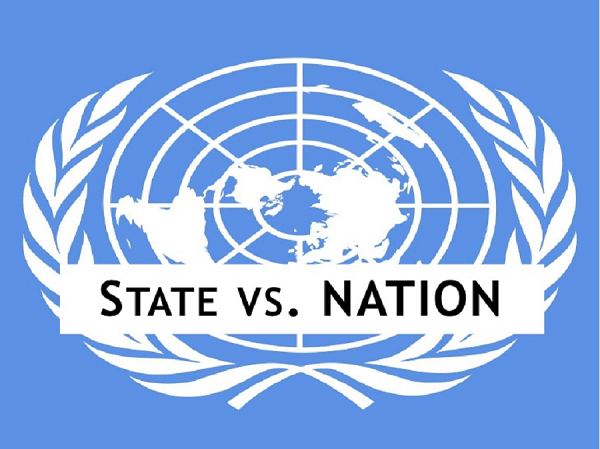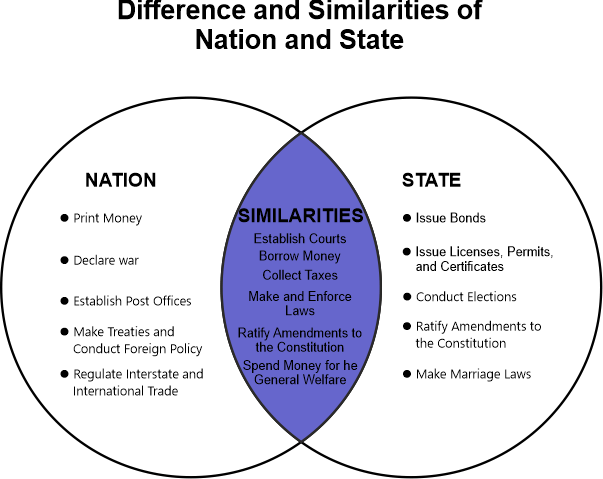Difference Between State and NationA state is a separate political entity with definite geographic boundaries. Whereas, a large collection of people who are united by a common heritage, history, culture, nationality, or language is known as a nation. 
What is a Nation?A collection of people who share a common dialect, language, a shared heritage, common historical line, and (often) a common physical territory is known as a nation. Once a group of people take control of formal committees of government, such as laws, unchanging geographical boundaries, and independence, this group of people is considered to as a state (political independence). Just like with the earlier medieval prince of Germany, a nation may be represented in one or more (typically nearby) states, whereas a state may consist of one or more countries (as did the Roman Empire and Austria-Hungary). A state that completely comprises of or is meant to be controlled by a single nation is called to be a nation-state. Nationalist MovementPolitical, cultural, or both elements may be included in a nationalist movement. A politically disciplined nationalist movement is an effort by a national committee to gather statehood, some degree of independence from, or autonomy within, a more significantly modified political association, such as a different state or an empire, using political, and occasionally military, means. A national organisation may also be fighting (reactionarily) to restrict the rights of minority groups, or it may be fighting for additional rights for its people within the confines of its own nation-state. A cultural nationalist movement is an initiative to locate, safeguard, study, or revitalise a nation's language or cultural traditions. Political movements often precede cultural nationalist ones, according to historical precedence. What is a State?An area of land is referred to as a state when it has a single head of state and is considered to be a politically organised community. The four fundamental components of a state are its land, people, administration, and sovereignty. Geographical factors define a state's boundaries. It is independent of all other states and has a unique system of government. The state's citizens could be from a variety of countries. A nation-state is a region that is solely inhabited by one nation. Nonetheless, many sovereign states around the world have a diversified population. It is possible to intentionally establish a state. A state has both political and legal power. For instance, Telangana became India's youngest and newest state in 2014. State vs NationIf a state has its own land, a permanent government, and a resident population in addition to its own institutions and people, this is considered evidence of its sovereignty. Additionally, it must be able to ratify treaties and other sorts of international agreements. A legitimate nation is a sizable group of people who reside in the same place and who share a common history, culture, language or other feature of their life. International war frequently breaks out when a region claims to be a country but other nations do not acknowledge it. One such illustration is Taiwan, which, in spite of Beijing's assertion that Taiwan is a fundamental component of China, claims to be an autonomous republic. As a result, in order to placate China, a number of nations have adopted the stance that they do not acknowledge Taiwan's independence. Difference between State and Nation
A state is a separate political unit with established boundaries. A nation is a vast group of people who are linked together by a shared ancestry, history, culture, ethnicity, or language.
State designates a region. A nation is a collective of people.
The territory of a state is set. No nation has a defined territory.
A state is a political and judicial body. A nation is a sociocultural group.
A state can be intentionally formed. A nation cannot be intentionally created.
Since a state is a manufactured notion, it is less stable than a nation. State instability is greater for a nation.
Without sovereignty, a state cannot exist. Without sovereignty, a nation can still exist.
Laws and rules unify a State. Bonds and common history bind a nation together. State and its CharacteristicsThere are four essential components to the state; if any are missing, the state is void.

Nation and its ResponsibilitiesA collection of people who have a common cultural identity and relationships are referred to be a nation. The Basque people of Spain, who view themselves as a separate nation since they are ethnically distinct from the rest of the country's residents, serve as an important illustration of this. A nation is frequently an imagined community, meaning that despite people's subjective feelings of belonging to the embodied unity, any relationships between them may be impersonal. There is no clear-cut description of what a nation is. A nation is built by people who share ethnic origins, a language, a religion, a shared memory of the past, and the explicit intention to function as a political group. But not every country is endowed with the characteristics of a sovereign, independent state. Likewise, not all states are federal republics. So, the term "nation" has two distinct meanings: it can refer to both a group of people who emerge in history and who see themselves as political subjects as well as a political and ideological formation. States that consider themselves to be the political form of the country frequently make this formation. Distinction of Countries in the PastIn 1933, a convention on the rights and obligations of states was convened in Montevideo, Uruguay, and a treaty was signed as a result. A state must be in solidarity and should stand clear with all four of the following conditions: it must have a permanent residency, a clearly managed territory, a functional government, and the power to engage in diplomatic conversation with the other states. According to the convention's stipulation that recognition by other governments was not a prerequisite for a country's existence, a country might exist even if other nations did not recognise it. A nation, on the other hand, could only be called to exist if other nations recognised it as a sovereign state, according to the founding theory of statehood. Characteristics of a Nation or a State in the Modern EraStates and Nations in the modern era have the following features and functionalities:
India and Its StatesThe democratic, secular, and sovereign republic of India, a union of states, is governed by a parliamentary system. The President is the Union's executive branch's chief according to the Constitution. The Governor works as the President's representative and is the chief executive in all separate states. States have a structure of government that is very similar to the Union's. The nation is divided into 28 states and 8 union territories. The President oversees the Union Territories through an Administrator that he or she has designated. Indian society is incredibly diverse in terms of caste, religion, ethnicity, linguistics, and culture, which contradicts preconceived notions about nation-states. Therefore, the notion of having a nation-state is okay but different nations in a single state are not correct. Beyond merely being a part of the post-colonial state, there is undoubtedly a sense that these communities are part of an organisation to which they are inextricably bound. India and its formation as a country have been very rough due to the India-Pakistan partition which saw thousands of deaths due to communal differences and disharmony. A shared history of societies and cultures justifies the current political unification of the bulk of India's geographically nearby areas under a single governmental authority. A civilised state is referred to as a political unification under a single state. Each state reflects a unique civilisation which has a different background of the cast, religion, history of ancestors and language.
Next TopicDifference between
|
 For Videos Join Our Youtube Channel: Join Now
For Videos Join Our Youtube Channel: Join Now
Feedback
- Send your Feedback to [email protected]
Help Others, Please Share









